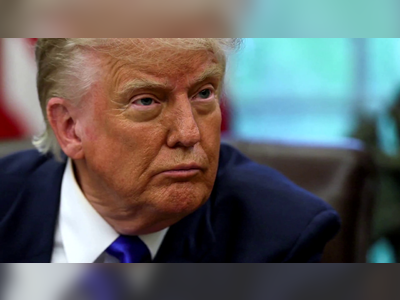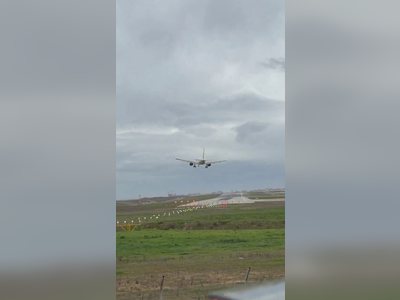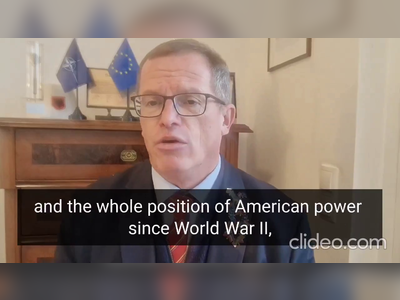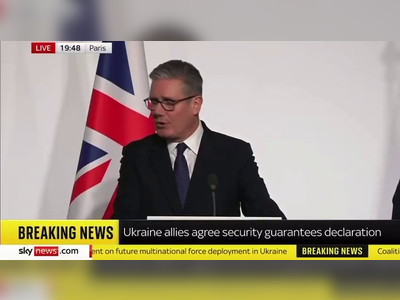Pentagon Issues Dire Warning on Russia Amid Heightened Global Tensions
Concerns escalate as GRU's covert operations revealed and US military aid to Ukraine faces scrutiny
A recent disclosure from the Pentagon described as a 'dire warning' concerning Russia has sparked international discussion.
This statement coincides with fresh revelations about clandestine operations allegedly orchestrated by the Russian military intelligence, the GRU.
The operation reportedly involved offering bounties to Taliban fighters for killing American and allied forces in Afghanistan prior to the announcement of the US withdrawal, according to a collaborative investigation by The Insider and Der Spiegel.
The operation was purportedly supervised by Ivan Kaszjanenko, deputy commander of the GRU's unit 29155, involved in high-profile sabotage missions in Europe.
The investigation suggests that Russia paid the Taliban approximately $30 million to pressure Western forces to exit Afghanistan, ceasing only after an agreement by then-President Donald Trump in early 2020.
Meanwhile, the unfolding of events in the Ukraine conflict continues to draw significant international attention.
The conflict reached another tragic milestone as Russian forces launched glide bomb attacks on Zaporizhzhia, claiming 13 lives and injuring many more, including fierce battles against North Korean troops allegedly supporting Russian efforts under coercion.
The United States, under Defense Secretary Lloyd Austin, announced a $500 million military aid package to Ukraine, marking the Biden administration's last aid effort amid ongoing hostilities.
This aid includes critical defensive weaponry aimed at bolstering Ukraine's capacity to withstand Russian aggression.
In response to rising geopolitical tensions, Europe finds itself navigating complex energy dynamics, with Slovakia expressing dissatisfaction over the suspension of Russian gas supplies due to political pressures from Ukraine and the European Union.
Slovak Prime Minister Robert Fico proposed significant sanctions against Ukraine if Russian gas transit through the country is not restored, pointing to considerable economic repercussions for Slovakia.
Amidst the hostilities in Ukraine, the Kyiv government has introduced new legislation encouraging military training for women on a voluntary basis, reflecting a broadening approach to national defense mobilization.
Moreover, efforts are underway to facilitate the return of Ukrainians abroad, with plans to provide employment opportunities within the defense sector.
Global cooperation also manifested in the establishment of an international drone coalition led by the UK and Latvia, joined by several NATO and allied countries, to supply Ukraine with advanced drone technology capable of countering Russian air defenses.
These developments come as Ukrainian President Volodymyr Zelensky continues diplomatic engagements with international leaders to secure comprehensive military and economic support for Ukraine's endurance amid the ongoing conflict.
As the situation evolves, the global community remains vigilant over Russia's next moves and the broader implications for security across Europe and beyond.
This statement coincides with fresh revelations about clandestine operations allegedly orchestrated by the Russian military intelligence, the GRU.
The operation reportedly involved offering bounties to Taliban fighters for killing American and allied forces in Afghanistan prior to the announcement of the US withdrawal, according to a collaborative investigation by The Insider and Der Spiegel.
The operation was purportedly supervised by Ivan Kaszjanenko, deputy commander of the GRU's unit 29155, involved in high-profile sabotage missions in Europe.
The investigation suggests that Russia paid the Taliban approximately $30 million to pressure Western forces to exit Afghanistan, ceasing only after an agreement by then-President Donald Trump in early 2020.
Meanwhile, the unfolding of events in the Ukraine conflict continues to draw significant international attention.
The conflict reached another tragic milestone as Russian forces launched glide bomb attacks on Zaporizhzhia, claiming 13 lives and injuring many more, including fierce battles against North Korean troops allegedly supporting Russian efforts under coercion.
The United States, under Defense Secretary Lloyd Austin, announced a $500 million military aid package to Ukraine, marking the Biden administration's last aid effort amid ongoing hostilities.
This aid includes critical defensive weaponry aimed at bolstering Ukraine's capacity to withstand Russian aggression.
In response to rising geopolitical tensions, Europe finds itself navigating complex energy dynamics, with Slovakia expressing dissatisfaction over the suspension of Russian gas supplies due to political pressures from Ukraine and the European Union.
Slovak Prime Minister Robert Fico proposed significant sanctions against Ukraine if Russian gas transit through the country is not restored, pointing to considerable economic repercussions for Slovakia.
Amidst the hostilities in Ukraine, the Kyiv government has introduced new legislation encouraging military training for women on a voluntary basis, reflecting a broadening approach to national defense mobilization.
Moreover, efforts are underway to facilitate the return of Ukrainians abroad, with plans to provide employment opportunities within the defense sector.
Global cooperation also manifested in the establishment of an international drone coalition led by the UK and Latvia, joined by several NATO and allied countries, to supply Ukraine with advanced drone technology capable of countering Russian air defenses.
These developments come as Ukrainian President Volodymyr Zelensky continues diplomatic engagements with international leaders to secure comprehensive military and economic support for Ukraine's endurance amid the ongoing conflict.
As the situation evolves, the global community remains vigilant over Russia's next moves and the broader implications for security across Europe and beyond.
AI Disclaimer: An advanced artificial intelligence (AI) system generated the content of this page on its own. This innovative technology conducts extensive research from a variety of reliable sources, performs rigorous fact-checking and verification, cleans up and balances biased or manipulated content, and presents a minimal factual summary that is just enough yet essential for you to function as an informed and educated citizen. Please keep in mind, however, that this system is an evolving technology, and as a result, the article may contain accidental inaccuracies or errors. We urge you to help us improve our site by reporting any inaccuracies you find using the "Contact Us" link at the bottom of this page. Your helpful feedback helps us improve our system and deliver more precise content. When you find an article of interest here, please look for the full and extensive coverage of this topic in traditional news sources, as they are written by professional journalists that we try to support, not replace. We appreciate your understanding and assistance.











